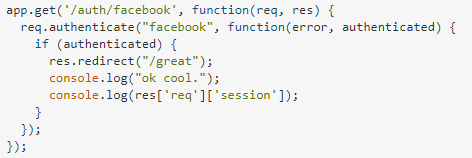I'm fairly new to Node.js and I am having some issues.
I am using Node.js 4.10 and Express 2.4.3.
When I try to access http://127.0.0.1:8888/auth/facebook, i'll be redirected to http://127.0.0.1:8888/auth/facebook_callback.
I then received the following error:
Error: Can't render headers after they are sent to the client.
at ServerResponse.<anonymous> (http.js:573:11)
at ServerResponse._renderHeaders (/home/eugene/public_html/all_things_node/projects/fb2/node_modules/connect/lib/patch.js:64:25)
at ServerResponse.writeHead (http.js:813:20)
at /home/eugene/public_html/all_things_node/projects/fb2/node_modules/connect-auth/lib/auth.strategies/facebook.js:28:15
at /home/eugene/public_html/all_things_node/projects/fb2/node_modules/connect-auth/lib/index.js:113:13
at next (/home/eugene/public_html/all_things_node/projects/fb2/node_modules/connect-auth/lib/strategyExecutor.js:45:39)
at [object Object].pass (/home/eugene/public_html/all_things_node/projects/fb2/node_modules/connect-auth/lib/authExecutionScope.js:32:3)
at [object Object].halt (/home/eugene/public_html/all_things_node/projects/fb2/node_modules/connect-auth/lib/authExecutionScope.js:29:8)
at [object Object].redirect (/home/eugene/public_html/all_things_node/projects/fb2/node_modules/connect-auth/lib/authExecutionScope.js:16:8)
at [object Object].<anonymous> (/home/eugene/public_html/all_things_node/projects/fb2/node_modules/connect-auth/lib/auth.strategies/facebook.js:77:15)
Error: Can't set headers after they are sent.
at ServerResponse.<anonymous> (http.js:527:11)
at ServerResponse.setHeader (/home/eugene/public_html/all_things_node/projects/fb2/node_modules/connect/lib/patch.js:50:20)
at next (/home/eugene/public_html/all_things_node/projects/fb2/node_modules/connect/lib/http.js:162:13)
at next (/home/eugene/public_html/all_things_node/projects/fb2/node_modules/connect/lib/http.js:195:11)
at next (/home/eugene/public_html/all_things_node/projects/fb2/node_modules/connect/lib/http.js:150:23)
at param (/home/eugene/public_html/all_things_node/projects/fb2/node_modules/connect/lib/middleware/router.js:189:13)
at pass (/home/eugene/public_html/all_things_node/projects/fb2/node_modules/connect/lib/middleware/router.js:191:10)
at Object.router [as handle] (/home/eugene/public_html/all_things_node/projects/fb2/node_modules/connect/lib/middleware/router.js:197:6)
at next (/home/eugene/public_html/all_things_node/projects/fb2/node_modules/connect/lib/http.js:198:15)
at Object.auth [as handle] (/home/eugene/public_html/all_things_node/projects/fb2/node_modules/connect-auth/lib/index.js:153:7)
Error: Can't set headers after they are sent.
at ServerResponse.<anonymous> (http.js:527:11)
at ServerResponse.setHeader (/home/eugene/public_html/all_things_node/projects/fb2/node_modules/connect/lib/patch.js:50:20)
at next (/home/eugene/public_html/all_things_node/projects/fb2/node_modules/connect/lib/http.js:162:13)
at next (/home/eugene/public_html/all_things_node/projects/fb2/node_modules/connect/lib/http.js:207:9)
at next (/home/eugene/public_html/all_things_node/projects/fb2/node_modules/connect/lib/http.js:150:23)
at param (/home/eugene/public_html/all_things_node/projects/fb2/node_modules/connect/lib/middleware/router.js:189:13)
at pass (/home/eugene/public_html/all_things_node/projects/fb2/node_modules/connect/lib/middleware/router.js:191:10)
at Object.router [as handle] (/home/eugene/public_html/all_things_node/projects/fb2/node_modules/connect/lib/middleware/router.js:197:6)
at next (/home/eugene/public_html/all_things_node/projects/fb2/node_modules/connect/lib/http.js:198:15)
at Object.auth [as handle] (/home/eugene/public_html/all_things_node/projects/fb2/node_modules/connect-auth/lib/index.js:153:7)
Error: Can't set headers after they are sent.
at ServerResponse.<anonymous> (http.js:527:11)
at ServerResponse.setHeader (/home/eugene/public_html/all_things_node/projects/fb2/node_modules/connect/lib/patch.js:50:20)
at next (/home/eugene/public_html/all_things_node/projects/fb2/node_modules/connect/lib/http.js:162:13)
at next (/home/eugene/public_html/all_things_node/projects/fb2/node_modules/connect/lib/http.js:150:23)
at next (/home/eugene/public_html/all_things_node/projects/fb2/node_modules/connect/lib/http.js:207:9)
at Object.auth [as handle] (/home/eugene/public_html/all_things_node/projects/fb2/node_modules/connect-auth/lib/index.js:153:7)
at next (/home/eugene/public_html/all_things_node/projects/fb2/node_modules/connect/lib/http.js:198:15)
at HTTPServer.handle (/home/eugene/public_html/all_things_node/projects/fb2/node_modules/connect/lib/http.js:211:3)
at Object.handle (/home/eugene/public_html/all_things_node/projects/fb2/node_modules/connect/lib/http.js:105:14)
at next (/home/eugene/public_html/all_things_node/projects/fb2/node_modules/connect/lib/http.js:198:15)
Error: Can't set headers after they are sent.
at ServerResponse.<anonymous> (http.js:527:11)
at ServerResponse.setHeader (/home/eugene/public_html/all_things_node/projects/fb2/node_modules/connect/lib/patch.js:50:20)
at next (/home/eugene/public_html/all_things_node/projects/fb2/node_modules/connect/lib/http.js:162:13)
at next (/home/eugene/public_html/all_things_node/projects/fb2/node_modules/connect/lib/http.js:150:23)
at next (/home/eugene/public_html/all_things_node/projects/fb2/node_modules/connect/lib/http.js:207:9)
at HTTPServer.handle (/home/eugene/public_html/all_things_node/projects/fb2/node_modules/connect/lib/http.js:211:3)
at Object.handle (/home/eugene/public_html/all_things_node/projects/fb2/node_modules/connect/lib/http.js:105:14)
at next (/home/eugene/public_html/all_things_node/projects/fb2/node_modules/connect/lib/http.js:198:15)
at /home/eugene/public_html/all_things_node/projects/fb2/node_modules/connect/lib/middleware/session.js:323:9
at /home/eugene/public_html/all_things_node/projects/fb2/node_modules/connect/lib/middleware/session.js:338:9
node.js:134
throw e; // process.nextTick error, or 'error' event on first tick
^
Error: Can't set headers after they are sent.
at ServerResponse.<anonymous> (http.js:527:11)
at ServerResponse.setHeader (/home/eugene/public_html/all_things_node/projects/fb2/node_modules/connect/lib/patch.js:50:20)
at next (/home/eugene/public_html/all_things_node/projects/fb2/node_modules/connect/lib/http.js:162:13)
at next (/home/eugene/public_html/all_things_node/projects/fb2/node_modules/connect/lib/http.js:207:9)
at /home/eugene/public_html/all_things_node/projects/fb2/node_modules/connect/lib/middleware/session.js:323:9
at /home/eugene/public_html/all_things_node/projects/fb2/node_modules/connect/lib/middleware/session.js:338:9
at Array.<anonymous> (/home/eugene/public_html/all_things_node/projects/fb2/node_modules/connect/lib/middleware/session/memory.js:57:7)
at EventEmitter._tickCallback (node.js:126:26)
The following is my code:
var fbId= "XXX";
var fbSecret= "XXXXXX";
var fbCallbackAddress= "http://127.0.0.1:8888/auth/facebook_callback"
var cookieSecret = "node"; // enter a random hash for security
var express= require('express');
var auth = require('connect-auth')
var app = express.createServer();
app.configure(function(){
app.use(express.bodyParser());
app.use(express.methodOverride());
app.use(express.cookieParser());
app.use(express.session({secret: cookieSecret}));
app.use(auth([
auth.Facebook({
appId : fbId,
appSecret: fbSecret,
callback: fbCallbackAddress,
scope: 'offline_access,email,user_about_me,user_activities,manage_pages,publish_stream',
failedUri: '/noauth'
})
]));
app.use(app.router);
});
app.get('/auth/facebook', function(req, res) {
req.authenticate("facebook", function(error, authenticated) {
if (authenticated) {
res.redirect("/great");
console.log("ok cool.");
console.log(res['req']['session']);
}
});
});
app.get('/noauth', function(req, res) {
console.log('Authentication Failed');
res.send('Authentication Failed');
});
app.get('/great', function( req, res) {
res.send('Supercoolstuff');
});
app.listen(8888);
May I know what is wrong with my code?

